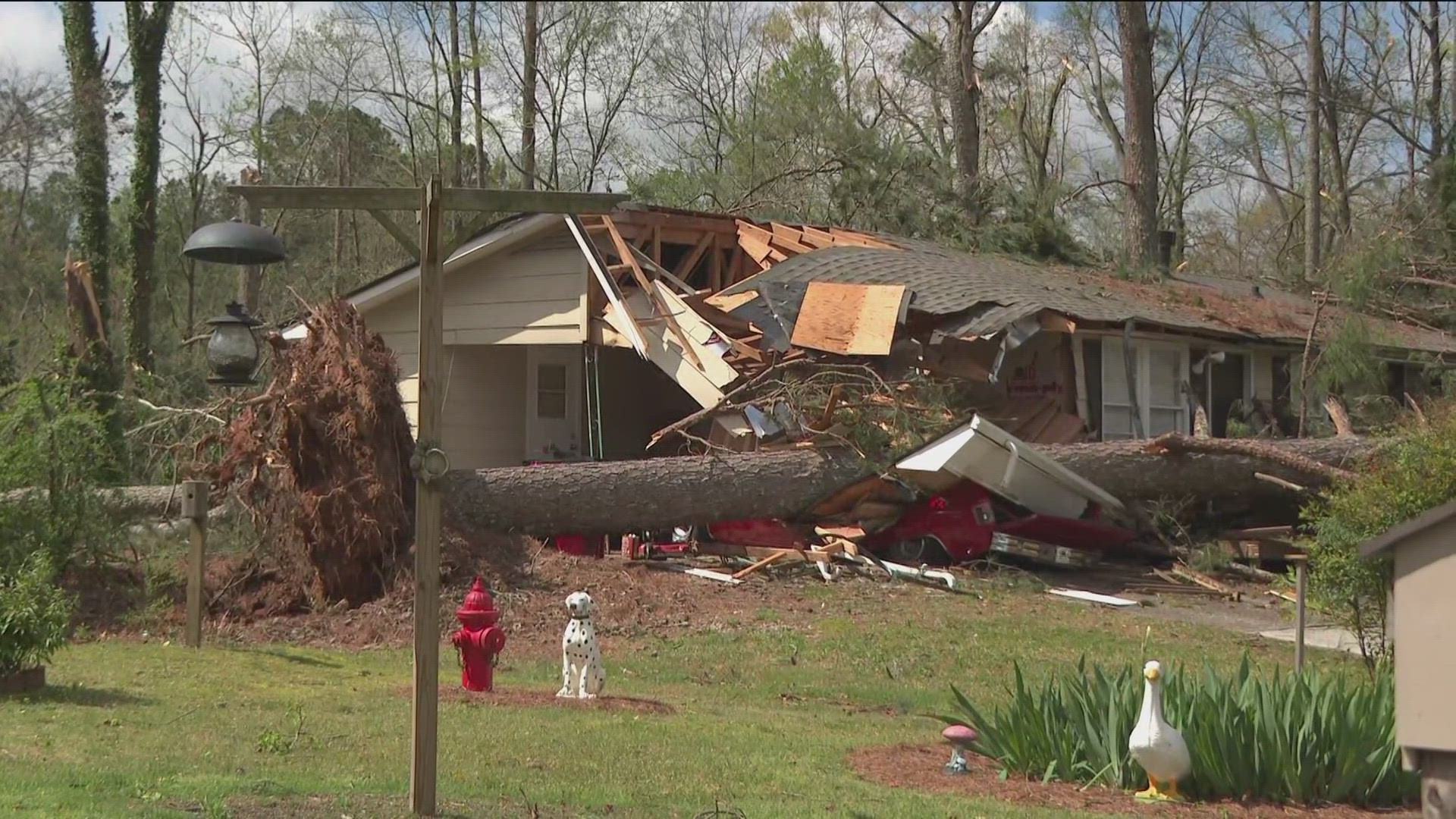CONYERS, Ga. — Severe storms moved across metro Atlanta late Tuesday and into the early morning hours of Wednesday, leaving behind significant damages in some instances.
Perhaps the hardest-hit area was Conyers, where an EF-2 tornado swept through with max winds of 115 mph, according to the National Weather Service.
11Alive has put together a list of ways to keep yourself safe while accessing the damage and cleaning up during the aftermath of tornadoes.
Check your home for damage:
If you hear shifting or "unusual noises," the CDC advises you to leave your home immediately. The shifting may mean the house is about to collapse.
The National Weather Service advises that you wear long-sleeved pants and clothes in addition to "sturdy shoes" when checking your home. Think of shoes like steel-toed boots or closed-toed shoes designed to protect you from damage.
Immediately check for damage to your home, like broken walls, floors, doors, windows and staircases.
What if my home has structural damage?
If you believe your home has structural damage like foundation cracks or missing support beams, get out of your home immediately. Structural damage could result in a house collapse, putting you and your family at risk of being in danger.
Georgia Emergency Management Agency and Homeland Security Agency Director James Stallings spoke during Kemp's storm update. Stallings urges residents to call their local EMA if they have damage.
If your home is safe, stay in place:
With the rising winds, limbs are still at risk of falling. Even if the storm is over, the threat of falling debris isn't. Staying home while crews repair extensive damage may be the safest option for you and your family.
Crews are working to restore power and cut down snapped trees that are blocking roadways. These crews take longer to make repairs when people are out on the road. If you can, stay home so repairs can be made as quickly as possible.
Be aware of damaged power lines:
When driving or walking around, keep your eye out for damaged power lines. Do not try to fix power lines themselves. If you are not a trained professional, do not mess with the lines.
If you see lines down, call local police or firefighters. You can also call Georgia Power at 1-888-891-0938. Residents can report outages to Georgia EMC at 770-775-7857.
Stay out of damaged buildings: If you suspect a building has been severely damaged, do your best to stay away. Debris like nails, broken glass and metal may be lying around. If you are helping someone out, make sure you're wearing the right clothes mentioned above.
Taking care of yourself after a tornado:
Preventing carbon monoxide poisoning: Equipment like generators, pressure washers, camp stoves and charcoal grills can cause carbon monoxide.
If too much carbon monoxide builds up in your home, you can suddenly die from poisoning. The CDC advises residents never to use these types of devices in their homes, basements, or garages.
Objects like grills and stoves should be kept at least 20 feet away from any window, door or vent. The CDC also suggests having a battery-operated carbon monoxide detector when using objects that burn fuel.
If your detector beeps, the CDC said you should leave your home immediately and call 911.
Drink and eat non-perishables: Residents should only eat and drink non-perishable items, according to the CDC.
Perishable foods that have been left without being refrigerated for hours should be thrown away. The CDC said even if they look fine or smell normal, they may be harboring deadly bacteria.
Take care of your mental health: Residents who've experienced a tornado should take care of their emotional health. Going through a tornado can be a traumatic experience for some. Checking in with your friends and family or talking to a mental health professional may help you process the event and reduce the anxiety typically felt after experiencing a tornado.
Keep yourself informed: The National Weather Services urges residents to stay informed about the latest updates following a tornado. Severe weather breakouts can happen at any moment, and during a weather emergency, information can be life-saving. As Stallings mentioned, the threats to your safety aren't over yet, as debris and damage linger.
Beware of insurance scammers:
If you've had property damage, you may be the target of insurance scammers, according to the Federal Trade Commission. The commission's website said, "Unlicensed contractors flock to disaster areas" in the hopes of taking advantage of natural disaster victims.
The Commission said residents should ask for important information like IDs, licenses, and proof of insurance if approached by a contractor. In addition to unlicensed contractors, scammers may pretend to be government officials or representatives from FEMA. For tips about how to identify a scammer, click the link here.

